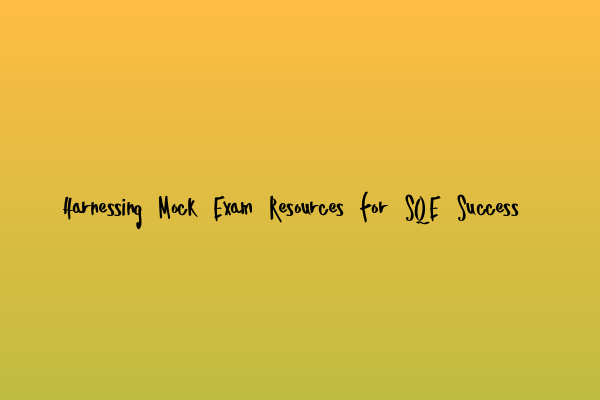Title: Harnessing Mock Exam Resources for SQE Success
Introduction:
When it comes to preparing for the Solicitors Qualifying Exam (SQE), there is no doubt that mock exams are an invaluable resource. Mock exams not only provide a realistic simulation of the actual examination environment but also serve as an effective tool for identifying strengths and weaknesses in one’s legal knowledge. In this blog post, we will delve into the world of mock exam resources and explore how you can effectively harness them to achieve success in the SQE.
1. Understanding the Importance of Mock Exams:
Mock exams are designed to closely resemble the structure and content of the actual SQE exam. By familiarizing yourself with the exam format, question types, and time constraints, you can reduce anxiety and improve your overall performance on the day of the real exam. Mock exams provide an opportunity to practice applying legal principles, refining your analytical skills, and honing your exam technique.
2. Accessing High-Quality Mock Exam Resources:
a. Online Platforms: There is a wide range of online platforms that offer comprehensive mock exam resources for the SQE. These platforms provide access to a variety of practice questions, mock exams, and model answers. Look for reputable platforms that align with the SQE syllabus and offer reliable, up-to-date content.
b. Official SQE Resources: The Solicitors Regulation Authority (SRA) provides official mock exams and sample questions on their website. These resources are specifically tailored to reflect the expectations and requirements of the SQE. Familiarize yourself with these official resources to get a sense of the exam style and content.
3. Incorporating Mock Exams into Your Study Plan:
a. Time Management: Allocate dedicated study sessions for completing mock exams. Treat these sessions as if they were the actual exam. This will help you get accustomed to the time constraints and develop a critical sense of pacing for each question.
b. Analysis of Results: After completing a mock exam, thoroughly analyze your performance. Identify areas of strength and weakness to guide your study plan. Pay attention to common mistakes and areas requiring improvement. In particular, focus on areas where you consistently struggle or lose valuable time.
c. Review and Consolidation: Use the model answers and explanations provided with each mock exam to review and consolidate your knowledge. Identify any knowledge gaps and seek appropriate study materials to strengthen your understanding of those areas.
4. Setting Realistic Goals and Tracking Progress:
a. Goal setting: Break down your SQE preparation into smaller, manageable goals. For example, aim to complete a certain number of mock exams each week or target specific areas of the syllabus. Setting realistic goals helps maintain focus and motivates you to actively engage with the mock exam resources.
b. Progress tracking: Keep a record of your performance in each mock exam. Monitor your progress over time to see how your scores and understanding have improved. Regularly revisiting your scores will help build confidence and assure you that your hard work is paying off.
Conclusion:
Harnessing mock exam resources is a crucial step towards achieving success in the SQE. By incorporating realistic exam practice, analyzing your performance, and setting realistic goals, you can enhance your exam readiness and improve your chances of success. Remember, the key is to continually learn from your mistakes, refine your exam technique, and consistently engage with high-quality mock exam resources. Good luck!

Leave a Reply